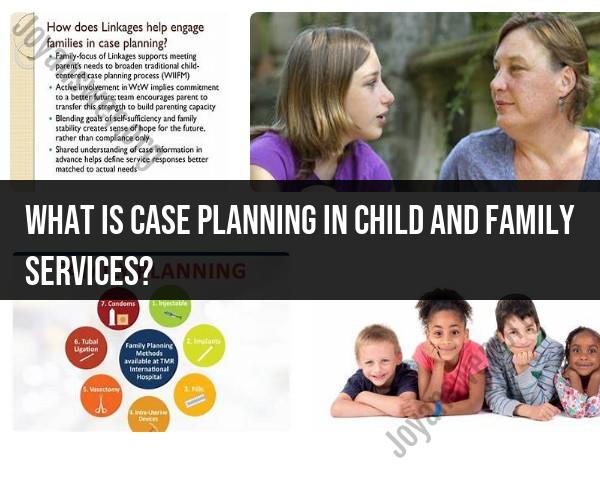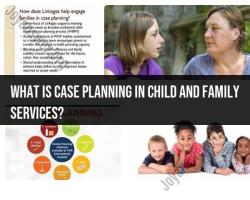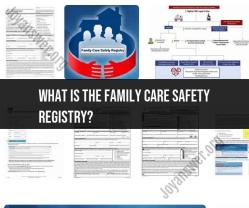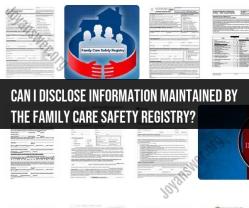What is case planning in child and Family Services?
Case planning in child and family services refers to the process of developing a comprehensive and individualized plan to address the needs and well-being of children and families who are involved with child welfare or social services agencies. This process is an integral part of child protective services, foster care, and family support programs and is designed to ensure the safety, permanency, and well-being of children while supporting and assisting families in need.
Key aspects of case planning in child and family services include:
Assessment: Social workers or child welfare professionals conduct a thorough assessment to understand the specific needs and challenges of a family and the individual needs of children. This assessment typically includes evaluating the safety of the child in their current living environment, assessing the family's strengths and weaknesses, and identifying potential risks or issues.
Goal Setting: Based on the assessment, specific goals are established for the family and child. These goals are often related to improving parenting skills, addressing substance abuse or mental health issues, ensuring a safe and stable living environment, and promoting the child's well-being.
Collaboration: Case planning involves collaboration with various stakeholders, including the family members themselves, social workers, therapists, legal professionals, and community resources. The active involvement of parents and caregivers in the planning process is encouraged.
Services and Interventions: To achieve the established goals, a range of services and interventions may be provided. These can include parenting classes, counseling, substance abuse treatment, housing assistance, educational support, and more. The specific services are tailored to the unique needs of each family.
Monitoring and Evaluation: Progress toward the established goals is regularly monitored and evaluated. Social workers assess whether the family is making the necessary changes and improvements to ensure child safety and well-being. Adjustments to the case plan may be made as needed.
Permanency Planning: In cases where children have been removed from their parents' care due to safety concerns, the case plan may also include permanency planning, which focuses on achieving a stable, permanent living situation for the child. This can involve reunification with parents, adoption, or placement with relatives or other caregivers.
Court Involvement: In many cases, the court system is involved in the case planning process, especially when child protective services have legal custody of a child. The court ensures that the case plan is followed and may make determinations regarding the child's placement and well-being.
The overarching goal of case planning in child and family services is to support families in overcoming challenges and providing a safe and nurturing environment for children. It is a holistic approach that recognizes the importance of family preservation and child safety while striving for positive outcomes for all involved parties.
Case Planning in Child and Family Services: An Overview
Case planning is a collaborative process of identifying and addressing the needs of children and families involved in child and family services. It is a critical component of ensuring that children and families are safe and have the support they need to thrive.
Case plans are typically developed by a team of professionals, including social workers, case managers, and therapists. The team works with the child and family to identify their strengths and challenges, develop goals, and create a plan to achieve those goals.
Case plans should be individualized and family-centered. They should be based on the child and family's unique needs and circumstances. Case plans should also be flexible and adaptable, as the child and family's needs may change over time.
The Process of Creating Effective Case Plans
The process of creating effective case plans typically involves the following steps:
- Assessment: The team conducts a comprehensive assessment of the child and family's needs. This includes assessing the child's safety, development, and well-being, as well as the family's strengths, challenges, and resources.
- Goal setting: The team and the child and family work together to develop goals for the case plan. These goals should be specific, measurable, achievable, relevant, and time-bound.
- Intervention planning: The team develops a plan for helping the child and family achieve their goals. This plan should identify the specific services and supports that will be provided.
- Implementation: The team implements the case plan and provides support to the child and family.
- Monitoring and evaluation: The team monitors the child and family's progress and evaluates the effectiveness of the case plan. The case plan is updated as needed to ensure that it is meeting the needs of the child and family.
Collaborative Case Planning for Child and Family Well-Being
Collaborative case planning is essential for ensuring that children and families receive the best possible services and support. Collaborative case planning involves working with the child and family, as well as other professionals, to develop and implement a case plan.
Collaboration is important because it allows the team to share information, resources, and expertise. It also allows the team to develop a more comprehensive understanding of the child and family's needs.
The child and family should be involved in all aspects of the case planning process. This includes identifying their goals, developing the intervention plan, and evaluating the plan's effectiveness.
Case Management Strategies in Family Services
Case management is a key component of case planning in child and family services. Case managers work with children and families to develop and implement their case plans. They also provide support and advocacy to children and families.
Effective case managers use a variety of strategies to support children and families. These strategies may include:
- Connecting families to resources: Case managers can help families to access the resources they need, such as food, housing, and healthcare.
- Advocating for children and families: Case managers can advocate for children and families with other professionals and systems.
- Providing support and guidance: Case managers can provide support and guidance to children and families as they work to achieve their goals.
Measuring Success through Comprehensive Case Planning
The success of case planning in child and family services is measured by the well-being of children and families. This includes factors such as safety, development, and permanency.
To measure the success of case planning, teams should regularly monitor the progress of children and families. This can be done through interviews, surveys, and other data collection methods.
Teams should also evaluate the effectiveness of case plans. This can be done by assessing whether the child and family are making progress towards their goals. Teams should also identify any areas where the case plan needs to be adjusted.
Conclusion
Case planning is a critical component of child and family services. It is a collaborative process of identifying and addressing the needs of children and families. Effective case planning is essential for ensuring that children and families are safe and have the support they need to thrive.




